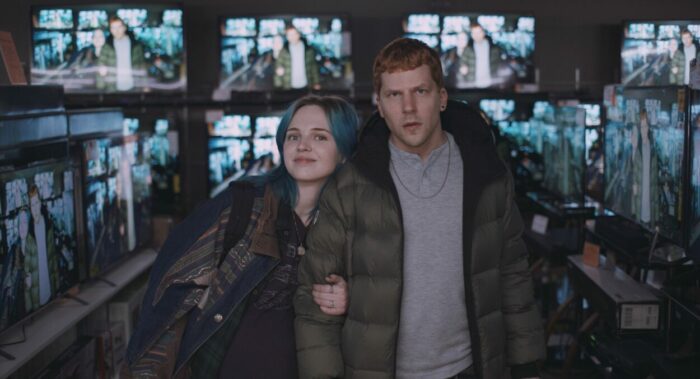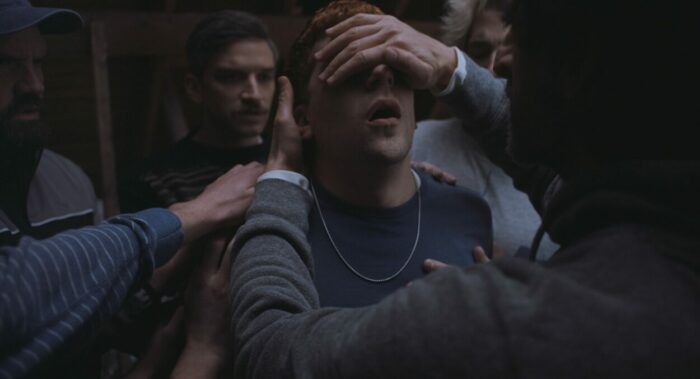John Trengove’s sophomore feature film Manodrome makes its inspirations obvious: among them are David Fincher’s Fight Club and Martin Scorsese’s Taxi Driver. In his most physical role yet, Jesse Eisenberg plays Ralphie, a gym-obsessed Uber driver who recently got laid off from his construction job and is also expecting a child with his pregnant girlfriend, Sal (Odessa Young). Ralphie isn’t quite the amalgamation of iconic fictional figures Tyler Durden and Travis Bickle—famously known for their toxic traits and hypermasculine energies. Sadly, Ralphie’s potential to grow into a compelling character is squashed by the film’s lack of direction and its muddled message.
Manodrome begins by following Ralphie in his daily routine, contemplating his identity in his car and the gym, and constantly comparing himself to those much bulkier than he is. Since he can’t gain muscle, Ralphie wolfs down protein bars and doesn’t eat anything else. It’s evident that something is simmering beneath his trying-to-be-tough demeanor—a wounded child whose anger towards his father leaving him and his mother behind is still very present. In every moment, Eisenberg effectively illustrates Ralphie’s wrestling with his two sides: the masculine, non-affected gym rat and the sensitive boy who yearns for validation.
The film’s atmosphere is dull, dreary, and lifeless, taking place in a New York town in the dreadful winter. In a scene where Ralphie and Sal are at a big-box store and they can’t afford to pay the total, it reveals that money is tight and every single penny counts. Throughout their whole interaction, Ralphie seems removed, impatient, and less than serious. There’s a sinister nature lurking underneath and it’s begging to come out.

Ralphie has no real direction or purpose in his life and the camera captures him aimlessly floating around until a compassionate gym pal of his Jason (Philip Ettinger) tells him about a group of wealthy guys who help people like them. With the increasingly looming pressure to make his reluctant entrance into fatherhood, a fed-up Ralphie decides he needs guidance. Thus, the Fight Club-esque plotline unfolds, and he meets the group, headed by a suave, patriarchal leader called Dad Dan (Adrien Brody). The mysterious all-male family is comprised of a few “fathers” and their “sons” and is where Ralphie bonds with like-minded brothers.
This family, as Ralphie discovers, practices celibacy and only answer to themselves, illuminating the man as God trope. They have completely cut themselves off from family, friends, and partners. Trengove (who also wrote the screenplay) drew inspiration from real-life extremist organizations formed online—such as The Proud Boys and Men Going Their Own Way. Manodrome responds to these types of communities that promote violence and anti-feminism, primarily influenced by far-right ideologies. The title is a play on the term “manosphere,” which refers to online heterogeneous forums comprised of misogynistic and masculine individuals. The root “drome” is a large specially prepared place, commonly used in reference to an airfield or airstrip. Regarding the film’s context, Manodrome symbolizes the suburban home that serves as the haven for Dad Dan’s male family.
Even though the group in the movie doesn’t engage in graphic acts, there are moments of intensity and rage, specifically as Ralphie unleashes an inner monster and becomes his own worst nightmare. Eisenberg shows his remarkable depth in a powerful initiation scene that was difficult and stomach-churning to watch.

His engaging in acts of violent behavior in the outside world stems from a suppressed frustration and albeit systematic rage that forms from sexual repression. There is a queer subtext evident as Ralphie struggles with his confusing identity (who he thinks he is and who he strives to be). Amidst this, he grapples with an innate softness and deep childhood trauma from being abandoned by his father and left to take care of his mother. Perhaps, stepping into the caretaker role once again is a scarring truth he is constantly battling.
Manodrome‘s theme of toxic masculinity is heavily referred to, yet is met with resistance multiple times. Even when Ralphie exhibits a horrifying and hateful part of him, he regresses to being a socially-anxious boy who can’t protect himself from his demons. However, when he gets hold of a gun and realizes he can’t rely on anybody else to save him is when he experiences true power, although fleeting and artificial.
Despite offering an intriguing premise with culturally relevant ideas about modern masculinity and male sensitivity, Manodrome‘s execution is rather lackluster and underwhelming. Trengove’s movie attempts to get to the root of an important subject but neglects to bring a fresh perspective into the conversation. The opportunity to explore a path less traveled in a tale told time and time again appears derivative.

Even the surprising twists and turns, incredible performances, and aesthetically pleasing cinematography can’t save Manodrome from becoming an ultimately meandering and pointless exposé of a lonely protagonist wrestling with the past and present.

![[L to R] Dare Taylor, Willow Grey, and Robin Bain, the stars and writer-director on the red carpet at the premiere of their movie Girls on Film (2023). Photo: credit Sammy Sarzoza.](https://filmobsessive.com/wp-content/uploads/2023/11/Girls-on-Film-Dare-Taylor-Willow-Grey-Robin-Bain-e1699735096539-200x134.jpg)


Wonderful writing! Insightful and relevant. Sounds like a potentially important film that just missed!